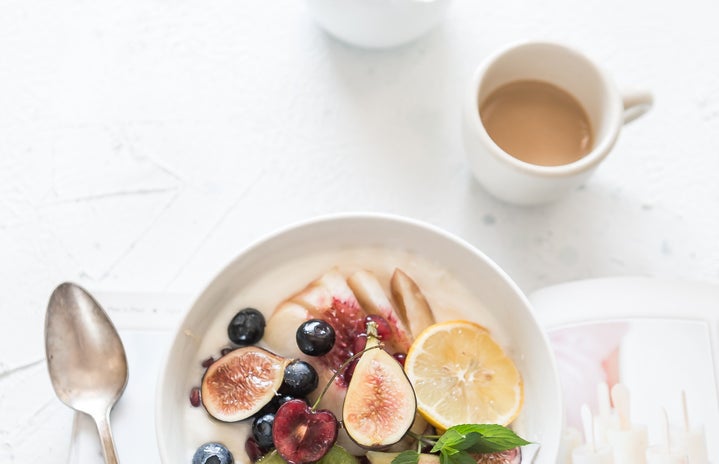Hello! I am Kayla Soriano, and I am a Environmental Policy major at Rutgers. A little about me, I am a foodie at heart, and I am passionate about environmentalism! Some of my friends call me a hippie. Anyhow, I was really fortunate to work for a not-for-profit that runs a two acre organic farm this summer. Working there, I was inspired by how they strive to implement organic and sustainable agricultural practices within the everyday suburban lifestyle. There are so many ways that you can reduce your carbon footprint and eat in a way that’s awesome to the Earth!
- Start your own garden in your room or backyard
-
Gardens give life to small spaces! They are super easy to maintain too! Vegetables like tomatoes, cucumbers, peppers, and herbs are easy to take care of in one’s backyard and require little space! All you need is a pot or bucket with a hole drilled in the bottom, seeds, and potting soil. Plant the seeds in the soil, and wait for the plant to grow! These plants may have to be watered from time to time, but if left outside, mother nature will do most of the work! Growing your own vegetables saves money and a trip to the grocery store too.
- Support local farms and farmers’ markets
-
If you don’t have the means to start your own garden, or want more variety of choices, or still want an outing like going to the supermarket, definitely check out your local farms and farmers’ market! The great thing about New Jersey being the Garden State is that there are so many small-scale farms around that grow fresh produce. Farmers’ markets are a great way to try out different vendors, walk around outside, and purchase healthy, locally grown produce! I love going to the farmers’ market with my friends to try out new meals. Quick plug: Rutgers has their own farmer’s market called Cook’s Market on Fridays at Rutgers Gardens. The Rutgers Food Pantry, at 39 Union, gives out market bucks for Cook’s Market for free if you show a Rutgers ID. Likewise, New Brunswick also holds farmers’ markets on Tuesday, Wednesdays, and Saturdays at various locations. Both places bring in many different vendors from around the area!
- Make more meals from home
-
Making meals from home is a fun way to eat healthily and sustainably. It saves on plastic waste from restaurants and allows you to choose which ingredients go into the meal. Cooking can be a lot of fun too. You get to personalize your own meal to fit the taste that you want. Plus, trying to cook different meals together can be a great way to connect with friends!
- Invest in Tupperware, freeze, and can
-
One of the biggest problems in the food consumption in America is food waste. A lot of food that still can be eaten is often thrown away because of the misconception that food will go bad if not eaten immediately. There are several ways that you can preserve your food so it doesn’t go bad as quickly. First, buy or save Tupperware containers. Honestly, I save hard plastic takeout containers from restaurants and use them to store leftovers for days. Likewise, semi-old fruits and vegetables can be frozen to be saved for another day! These frozen foods can be reheated or utilized for smoothies or other frozen snacks. One of my favorite snacks is frozen ripe bananas covered in chocolate. It tastes almost like ice cream! Canning is also a great way to preserve produce from going bad. You can can fruits, vegetables as well as jams, sauces, and pickled vegetables. To can, just invest in a canning pot, canning tongs, and mason jars with lids. Canning fruits can be as simple as putting fruit, water, and sugar into a jar and boiling that jar in the canning pot for 35 minutes until it is sealed. Canned produce also will not go bad until the jar is opened.
- Compost
-
Did you know that in America 40% of food gets thrown away? While much of this waste is produced by large grocery stores, consumers and households also throw away so much food! But, fruits and vegetables do not have to end up in landfills where they produce so much menthane. Instead they can be composted and turned into great fertilizer. Compost is decomposed organic matter that enriches the soil and helps plants retain moisture. You can compost anywhere! Certain towns and schools have compost centers where you can drop off your food scraps to be composted in a large facility. If you are living at home this semester and do not have a compost facility near you, you can compost from home! Freeze food scraps or store them in the refrigerator to prevent them from rotting. By setting up bins in your backyard in a sunny location, add food scraps and brown and green materials. Once your compost pile is established, you can turn it every few days to aerate.
- Try foraging
-
Okay, this might sound a little insane, but did you know that there are so many wild plants in nature that are edible? Meaning all you have to do is go into your backyard or local woods to find food! Foraging is a great way to experience the natural world and connect with something ancient within ourselves. Some great plants to look for to eat include dandelion, purslane, lemon balm, wood sorrel, and plantain. Using a mentor or a good field guide, you can learn different plants that are super nutritious and even a few poisonous plants too. Foraging can be a great addition to a hike or other activity


